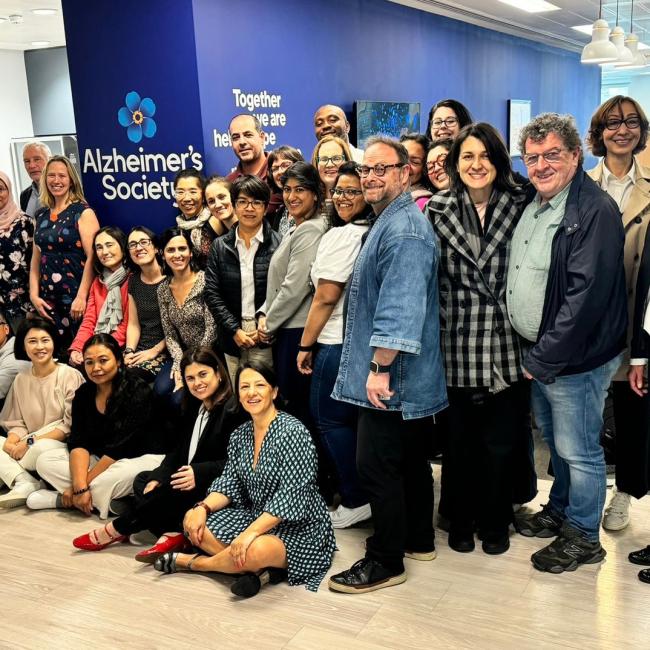Continued Learning in a Global Classroom
With COVID-19 driving communities across the globe to physically distance, suddenly our two-dimensional screens have heightened significance. They are portals into a three-dimensional world of human connection, comfort, and knowledge exchange.
One click of a Zoom link and colleagues are now faces framed in tiny boxes. Familiar voices punctuate the silence. We see hints of personal lives – a cat meandering across the couch or a record collection arranged just so on a shelf. This is a space where we meet our communities, nurture one another, and spark ideas.
“Though we are physically separated, we are using technology to maintain and to grow our community,” said Brian Lawlor, Deputy Executive Director of the Global Brain Health Institute (GBHI). “We are learning to connect and communicate in very different ways that are creating opportunities for innovation and this is going to make our community even stronger.”
In this collective call and response across time zones, a burgeoning set of livestreamed community learning opportunities provide a chance for Atlantic Fellows for Equity in Brain Health to connect. They build on their core learning experience at GBHI, which has always employed virtual tools to connect across GBHI sites and the global network.
For instance, Clinical Rounds, Global Neurology Forum, and Master Classes—three supplemental offerings of the Atlantic Fellows for Equity in Brain Health program—encourage online learning and dialogue across cohorts worldwide. Occurring monthly or every two months, offerings range from deepening clinical expertise to developing multi-disciplinary growth.
“After returning home to Sao Paulo, these opportunities give me the chance to see my peers, meet the new fellows, and continue to strengthen our work to protect brain health,” said Maira Okada de Oliveira, Atlantic Senior Fellow and neuropsychologist.
The Doctor is “In”
During the online GBHI Clinical Rounds for Case-Based Education, an Atlantic Senior Fellow and a lead clinician join a global audience of Atlantic Fellows and Senior Fellows to discuss a challenging neurodegenerative, psychiatric, or geriatric case. Moderated by GBHI leaders, including GBHI Co-Director, Bruce Miller, the rounds have a sense of reunion, discovery, and cultural exchange, and have included cases from Argentina, Brazil, Mexico, Spain, and Taiwan.
Two Tracks: Exploring a Patient Case and Care in Diverse Settings
The Global Neurology Forum is for those looking to expand their knowledge about the diagnosis and management of neurological conditions. Organized by GBHI and the Global Teleneurology Service at UCSF, the Global Neurology Forum has two tracks: Clinical pathological case conferences and exploring core challenges in global neurology. Directed by GBHI faculty, Salvatore Spina, the clinical pathological case conference track offers a deep dive into the pathology and other aspects of neurodegenerative dementia syndromes using real-life cases.
The second track is for those looking to learn more about a specific brain health challenge in a global context. Directed by Jon Van Leeuwen, and Riley Bove, the Global Teleneurology Service generally draws on expertise of physicians who have worked in resource-limited settings. Topics have included mental health, epilepsy care, use of technology, MS; Parkinson’s disease; and coma exam. Selected recordings of The Global Neurology Forum sessions are available on YouTube.
Professional Skills for Leaders
Master classes offer unique opportunities for Atlantic Fellows to learn from experts and each other, about cross-disciplinary topics, including fundraising, self-care, communications, leadership training, and more. From the musician to the neurologist to the policy professional, Atlantic Fellows come from a wide range of disciplines. Through master classes, they continue to connect to build and hone professional skills to advance brain health.
“We want to equip our fellows and senior fellows with the evolving tools, knowledge, and relationships needed to serve them well as brain health leaders,” said Victor Valcour, Executive Director of GBHI. “We hope these supplemental opportunities will enhance their ability to learn and provide tangible engagement in new ways.”
Authors
Camellia Latta, MLA
Program Director for Alumni Relations & Special Initiatives, GBHI at UCSF




